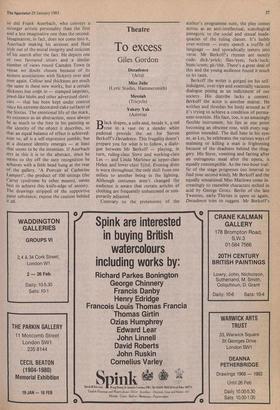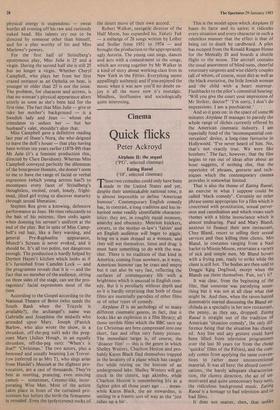Theatre
To excess
Giles Gordon
Decadence (Arts)
Miss Julie (Lyric Studio, Hammersmith)
Messiah (Tricycle)
Yakety Yak (Astoria)
Black drapes, a sofa and, beside it, a red rose in a vase on a slender white pedestal provide the set for Steven Berkoff's Decadence. This frugality doesn't prepare you for what is to follow, a dialo- gue between Mr Berkoff — playing, in turn, ruling-class Steve and working-class Les — and Linda Marlowe as upper-class Helen and lower-class Sybil. Evening dress is worn throughout, the only shift from one milieu to another being in the lighting. Although costumes aren't changed the audience is aware that certain articles of clothing are frequently unbuttoned or tem- porarily adjusted.
Contrary to the pretensions of the author's programme note, the play comes across as an anti-intellectual, scatological panegyric to the social and sexual inade- quacies of the ruling classes. It's lushly over-written — every speech a truffle of language — and sporadically teeters into verse. Mr Berkoff's rhymes are mostly rude: dick/prick; flies/eyes; fuck/suck; bum/scum; git/shit. There's a great deal of this and the young audience found it much to its taste.
Berkoff the writer is gorged on his self- indulgent, over-ripe and essentially vacuous dialogue posing as an indictment of our society. His diatribe lacks a context. Berkoff the actor is another matter. He writhes and threshes his body around as if it's trying to achieve a condition of perma- nent erection. His face, too, is an amazingly flexible instrument, his lips at one point becoming an obscene rose, with every sug- gestion intended. The dull hate in his eyes as, as Les, he celebrates the various ways of maiming or killing a man is frightening because of the deadness behind the thug- gery. His Steve, vomiting and farting after an outrageous meal after the opera, is equally contemptible. As the two-hour traf- fic of the stage progresses (no interval to find your second wind), Mr Berkoff and the equally sensational Miss Marlowe come in- creasingly to resemble characters etched in acid by George Grotz. Berlin of the late Twenties, early Thirties is upon us again, Decadence tries to suggest. Mr Berkoff's
physical energy is stupendous — sweat hurtles all evening off his raw and curiously naked head. His talents cry out to be directed by someone other than himself, and for a play worthy of his and Miss Marlowe's powers.
For the first half of Strindberg's eponymous play, Miss Julie is 25 and a virgin. During the second half she is still 25 but no longer a virgin. Whether Cheryl Campbell, who plays her from her first crazed entrance as an Ophelia on heat, is younger or older than 25 is not the issue. The problem, for character and actress, is that no woman's physical appearance alters utterly as soon as she's been laid for the first time. The fact that Miss Julie — give or take her mother's background — is a Swedish lady and Jean -- whom she stimulates to seduce her — but her husband's valet, shouldn't alter that.
Miss Campbell gave a definitive reading last year of Ibsen's Nora, she who deigned to leave the doll's house — that play having been written ten years earlier (1878-89) than Ms Julie (it's a feminist production this, directed by Clare Davidson). Whereas Miss Campbell conveyed perfectly the dilemmas of the bourgeoise Ibsenite, she doesn't seem to me to have the range of facial or verbal expression (which young actress has?) to encompass every facet of Strindberg's thoughtless, excited, cruel, lonely, fright- ened, jilted girl trying to discover maturity through sexual liberation.
Stephen Rea gives a knowing, defensive performance as Jean. He rises reluctantly to the bait of his mistress, then sinks again when donning his servant's uniform at the end of the play. But in spite of Miss Camp- bell's red hair, like a fiery warning, and general Pre-Raphaelite appearance, Munch's Scream is never evoked, and it should be. It's all too polite, not dangerous enough. The production is hardly helped by Dermot Hayes's kitchen which looks as if it's furnished from Camden Lock — and the programme reveals that it is — and the fact that no member of the audience, sitting on three sides of the stage, can see the pro- tagonists' facial expressions most of the time.
According to the Gospel according to the National Theatre of Brent (who needs the South Bank when the Tricycle is available?), the archangel's name was Gabrielle and Josephine the midwife who attended upon Mary. Joseph (Patrick Barlow, who also wrote the show, in a shrunken, off-the-peg suit) asks the preg- nant Mary (Julian Hough, in an equally shrunken, off-the-peg suit): 'When's it due?' Christmas.' The two actors, plus a bemused and usually beaming Lee Trevor- row (referred to as Mrs T), who sings arias from Handel's Messiah at the slightest pro- vocation, are a cast of thousands. They're best as snorting, prancing, even mincing camels — sometimes, Centaur-like, incor- porating Wise Men. Most of the action takes place in front of the curtained pro- scenium but before the birth the firmament is revealed. Even the (polystyrene) rocks of the desert move of their own accord.
Robert Walker, energetic director of the Half Moon, has expanded his Yakety Yak — a melange of 28 songs written by Leiber and Stoller from 1951 to 1974 — and brought the production to the appropriately ugly Astoria. The young cast sings, dances and acts with a commitment to the songs, which are strung together by Mr Walker in a kind of story about working-class lives in New York in the Fifties. Everything seems appallingly authentic and if you enjoyed the music when it was new you'll no doubt en- joy it all the more now it's nostalgic. Mindless, inoffensive and sociologically quite interesting.







































 Previous page
Previous page